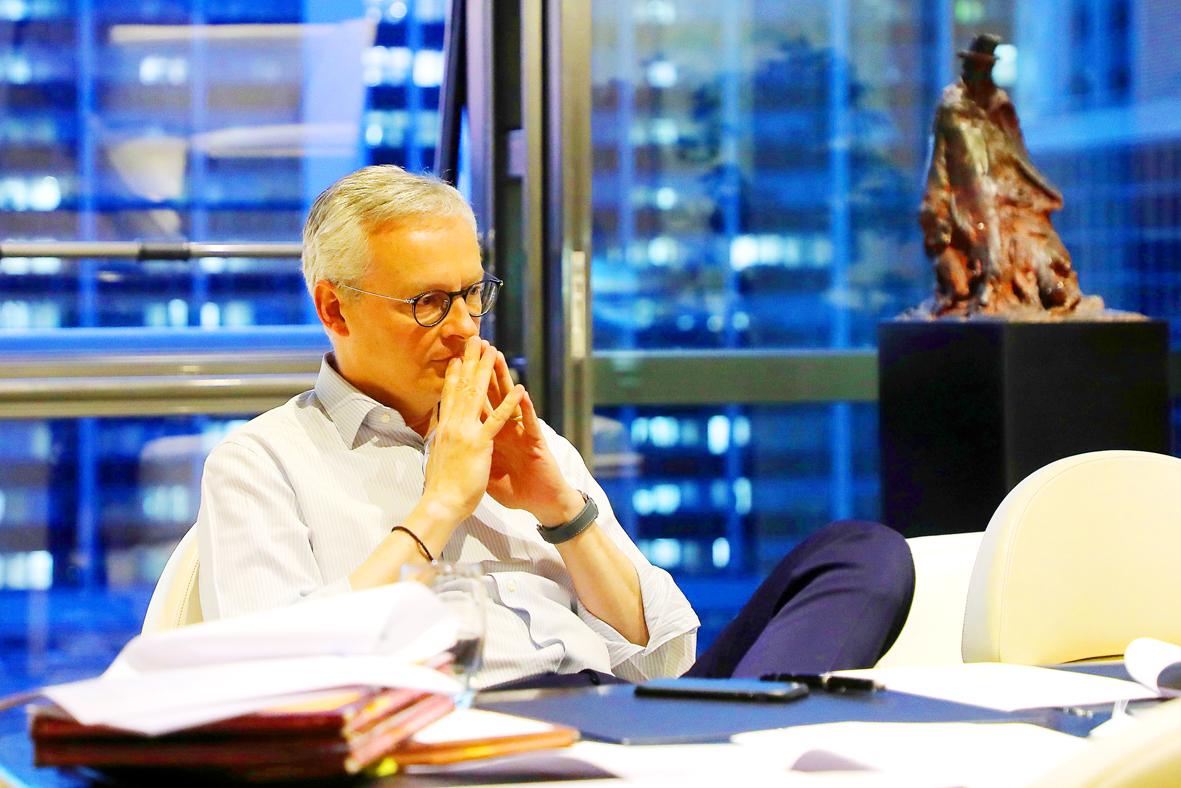EU finance ministers on Thursday agreed on a 540 billion euros (US$591 billion) package of measures to combat the economic fallout of the global COVID-19 pandemic. It is now up to EU leaders to approve the accord, which would require overcoming profound political disagreements.
In an emergency teleconference, the Eurogroup approved a plan to stave off what is expected to be a recession of unprecedented size.
The deal would lay to rest — at least temporarily — concerns that the EU was incapable of uniting behind a common strategy when it was most urgently needed.

Photo: AFP
In a sign of relief, ministers broke out in applause once a consensus was struck.
“Today, we agreed on three safety nets, and a plan for the recovery to ensure we grow together and not apart once the crisis is behind us,” said Portuguese Minister of Finance Mario Centeno, who heads the Eurogroup.
The common response includes a joint 100 billion euros employment insurance fund, a European Investment Bank instrument intended to supply 200 billion euros of liquidity to companies, as well as credit lines of as much as 240 billion euros from the European Stability Mechanism — the eurozone’s bailout fund — to backstop states as they go on a spending spree to help get economies back on their feet.
The ministers also agreed to work on a temporary fund that would help kick-start the recovery and support the hardest-hit nations, while not defining how it would be financed.
French Minister of the Economy and Finance Bruno Le Maire said the fund could be decided on in the next six months and could total 500 billion euros.
All of it needs approval by EU government leaders as early as next week, and tensions persist.
With several key divisions papered over, disagreements are likely to resurface when leaders are called to sign off.
The COVID-19 pandemic has overwhelmed Europe, with the continent suffering more than 65 percent of the worldwide deaths attributable to the coronavirus.
The scale of the damage shines a spotlight on the vulnerabilities of a union whose sense of common purpose has been tested over the past decade by the Greek debt crisis, an influx of refugees and Brexit, but the pandemic — in the words of German Chancellor Angela Merkel, a veteran of many geopolitical fights — poses the biggest threat to the EU since World War II.
Europe’s more-frugal north is pitted against Italy and Spain, the worst-affected nations, in a climate of mistrust and simmering resentment.
Disagreements were laid bare earlier this week when finance ministers failed to agree on a joint response after 16 hours of bitter negotiations.
Things were different on Thursday.
The meeting was delayed by nearly five hours while key nations — including the Netherlands, Italy, France, Germany and Spain — negotiated a compromise that would ultimately be uncomfortable to most, yet acceptable to all.
Once the meeting started, it took just 30 minutes to declare success.

UNCERTAINTY: Innolux activated a stringent supply chain management mechanism, as it did during the COVID-19 pandemic, to ensure optimal inventory levels for customers Flat-panel display makers AUO Corp (友達) and Innolux Corp (群創) yesterday said that about 12 to 20 percent of their display business is at risk of potential US tariffs and that they would relocate production or shipment destinations to mitigate the levies’ effects. US tariffs would have a direct impact of US$200 million on AUO’s revenue, company chairman Paul Peng (彭雙浪) told reporters on the sidelines of the Touch Taiwan trade show in Taipei yesterday. That would make up about 12 percent of the company’s overall revenue. To cope with the tariff uncertainty, AUO plans to allocate its production to manufacturing facilities in

TAKING STOCK: A Taiwanese cookware firm in Vietnam urged customers to assess inventory or place orders early so shipments can reach the US while tariffs are paused Taiwanese businesses in Vietnam are exploring alternatives after the White House imposed a 46 percent import duty on Vietnamese goods, following US President Donald Trump’s announcement of “reciprocal” tariffs on the US’ trading partners. Lo Shih-liang (羅世良), chairman of Brico Industry Co (裕茂工業), a Taiwanese company that manufactures cast iron cookware and stove components in Vietnam, said that more than 40 percent of his business was tied to the US market, describing the constant US policy shifts as an emotional roller coaster. “I work during the day and stay up all night watching the news. I’ve been following US news until 3am

Taiwan will prioritize the development of silicon photonics by taking advantage of its strength in the semiconductor industry to build another shield to protect the local economy, National Development Council (NDC) Minister Paul Liu (劉鏡清) said yesterday. Speaking at a meeting of the legislature’s Economics Committee, Liu said Taiwan already has the artificial intelligence (AI) industry as a shield, after the semiconductor industry, to safeguard the country, and is looking at new unique fields to build more economic shields. While Taiwan will further strengthen its existing shields, over the longer term, the country is determined to focus on such potential segments as

COLLABORATION: Given Taiwan’s key position in global supply chains, the US firm is discussing strategies with local partners and clients to deal with global uncertainties Advanced Micro Devices Inc (AMD) yesterday said it is meeting with local ecosystem partners, including Taiwan Semiconductor Manufacturing Co (TSMC, 台積電), to discuss strategies, including long-term manufacturing, to navigate uncertainties such as US tariffs, as Taiwan occupies an important position in global supply chains. AMD chief executive officer Lisa Su (蘇姿丰) told reporters that Taiwan is an important part of the chip designer’s ecosystem and she is discussing with partners and customers in Taiwan to forge strong collaborations on different areas during this critical period. AMD has just become the first artificial-intelligence (AI) server chip customer of TSMC to utilize its advanced